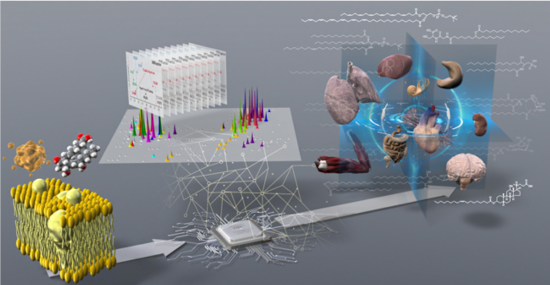Jun. 19, 2020 Press Release Biology
Advancing lipidomics: researchers establish atlas of lipids in living organisms
In an effort intended to accelerate research into lipids, a research group led by scientists from the RIKEN Center for Integrative Medical Sciences (IMS), the RIKEN Center for Sustainable Resource Science (CSRS), and the Graduate School of Pharmaceutical Sciences, Keio University, have created a standardized atlas of lipids (lipidome), whose main biological functions include the formation of cell membranes, storage and production of energy, and regulation of cellular signals.
Because lipids are extremely diverse molecules, the precise determination of different molecular species of lipid—a process the authors have termed “LipoQuality,” is important for understanding their functions in physiology and disease, and for discovering novel bioactive lipids that may have therapeutic benefits. In general, dysregulated lipid metabolism is associated with diseases such as obesity, atherosclerosis, stroke, hypertension and diabetes, and hence there is great interest in furthering our understanding of how they behave within complex biological systems.

A powerful method for analyzing lipid metabolites is liquid chromatography tandem mass spectrometry (LC-MS/MS). The research group used state-of-the-art LC-MS/MS and informatics techniques to untangle information on lipid mass spectral fragmentations to make a very accurate—with an estimated false discovery rate of just 1 to 2 percent—atlas of lipids. They analyzed 1,056 biological samples from a range of sources including human blood, mouse tissues, other mammalian cells, algae, and plants. To comprehensively extract information on lipids from the mass spectrometry big data, they developed an untargeted lipidomics platform, packaged in MS-DIAL 4 (Mass Spectrometry-Data Independent AnaLysis software version 4; http://prime.psc.riken.jp/). From the work, they derived a catalog of 8,051 different lipids in 117 categories. In addition, the authors created a comprehensive database of lipid structures with their mass spectrum properties such as retention time, collision cross section, and mass fragmentation pattern to correctly characterize lipids, and their product has been published as a “lipidome atlas”.
According to Hiroshi Tsugawa, the first author of the paper, published in Nature Biotechnology, “We discovered a number of interesting facts about the lipids found in different tissues through our work, and believe that our study revealing structure of previously unknown lipids will uncover novel lipid pathways by integrating other omics data such as proteomics and genomics.” Makoto Arita, who led the research group, says, “Our research on the biology of LipoQuality seeks to understand the molecular mechanisms through which specific lipid structures elicit their biological functions, and how the coordinated dynamics of these lipids maintain cellular and tissue homeostasis. This untargeted lipidomics platform is a powerful technology for visualizing lipid networks unbiasedly, and will open up a new avenue for discovering potential links between lipid metabolism and biological phenotypes.”
For more information on the concept of LipoQuality, a word coined from “lipid” and ”quality,” with the aim to emphasize the notion that not only the quantity of lipids, but also the quality, or the molecular diversity of lipids, is important for human health and diseases, see the following website: https://sites.google.com/site/lipoqualityjpn/homeE.
Reference
- Tsugawa et al. (2020) A lipidome atlas in MS-DIAL 4. Nat Biotech. doi: 10.1038/s41587-020-0531-2
Contact
Team Leader
Makoto Arita
Laboratory for Metabolomics
RIKEN Center for Sustainable Resource Science
Researcher
Hiroshi Tsugawa
Laboratory for Metabolomics
RIKEN Center for Sustainable Resource Science
Jens Wilkinson
RIKEN International Affairs Division
Tel: +81-(0)48-462-1225 / Fax: +81-(0)48-463-3687
Email: pr [at] riken.jp
